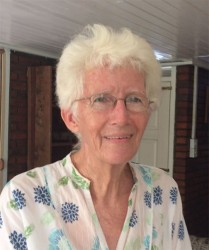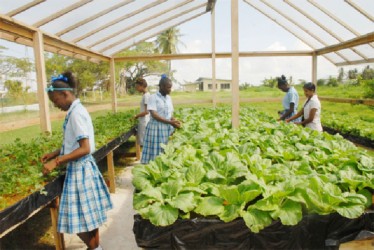Four special needs schools—the Georgetown-based David Rose School and its counterpart institutions at New Amsterdam, Linden and Diamond—have embarked on a project that will provide around 80 deaf students and 40 otherwise differently able ones with the opportunity to acquire a valuable self-sustaining skill and an opportunity to take a small but significant step into the world of business.
The Skills Development and Income Generation through Shade house Farming Project will train both students and teachers in shade house farming and in the business aspect of managing a small agricultural enterprise. The project will be executed with the technical support of Partners of the Americas. Each of the schools that are part of the project will benefit from a shade house which will be erected and stocked with seedlings. The shade houses will be maintained by students and teachers of the respective schools who will be trained in the requisite agricultural and entrepreneurial skills. The project is being financed through a $2 million government grant out of a $20 million disability fund for vocational training and income generation created by the Government of Guyana in 2011.


With the success of the project heavily dependent on the patronage of an empathetic business community, Stabroek Business has learnt that the Pegasus, Glow and Wind Jammer hotels have agreed to enter into business arrangements with the David Rose School, which has already erected its shade house and commenced production. The remaining institutions have been charged with engaging the business community with a view to securing markets for their produce. Procedures for the effective execution of the project include the efficient maintenance of the relevant sales and accounting records.
The project, which got underway in January this year and which is being overseen by the Deaf Association of Guyana (DAG) envisages the creation of modest but sustainable shade houses that function as independent business enterprises in support of the schools to which they are attached. An equally important aspect of the project is the creation of sustainable livelihoods for the differently able students beyond their school lives.
Shared responsibility for the effective execution of the project will see Partners of the Americas playing a lead role in supporting the identification and preparation of appropriate shade house sites in the school compounds; overseeing the erection of shade houses and ensuring that the facilities are equipped and stocked with seedlings. Partners will also be involved in training teams of teachers and students in record keeping and marketing
Targeted schools, meanwhile, are responsible for mobilising parent support for the project and at the David Rose School some parents have already had the opportunity to see the project and to purchase produce cultivated by their children. Schools are also responsible for integrating project activities into the regular school curriculum in order to ensure sustainability.





